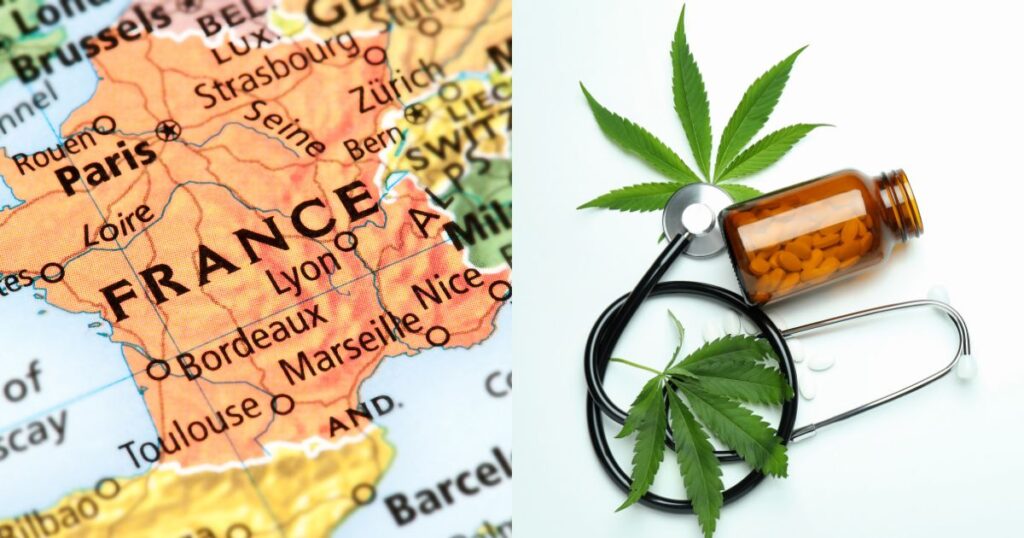France, long known for its conservative stance on cannabis, is taking steps to add medical cannabis into its healthcare system. Recent actions are a significant step forward toward formalizing its framework for production, prescription, and access to cannabis-based medicines. While these advancements remain restrictive compared to other cannabis markets around the world, they represent a crucial phase in France’s evolving stance on medical cannabis.
France’s Regulatory Shift of Medical Cannabis
Over the past four years, France has been experimenting with a pilot program that allowed 1,600 patients access to medical cannabis for specific conditions, including chronic neuropathic pain, multiple sclerosis symptoms, epilepsy, and chemotherapy-associated side effects. This trial, while limited in scope, provided data and highlighted gaps in the country’s medical cannabis policies.
Now, France is transitioning to a regulated framework following the submission of three decrees to the European Union for approval, as first reported by Newsweed.fr. These decrees lay the foundation for the production, prescription, and dispensing of cannabis medicines, ensuring compliance with EU regulations. It’s a long-anticipated step forward after years of political delays. While the framework aims to address the healthcare needs of up to half a million potential patients by 2035, the rollout reflects a measured approach to balancing accessibility with safety and control by the French government.
A Controlled Integration of Cannabis into Healthcare
France’s proposed framework introduces strict controls on every aspect of its medical cannabis system. For instance, cannabis prescriptions will only be permitted under specific conditions as a treatment of last resort. Patients must show proof of intolerance to or failure of conventional therapies, limiting the treatment’s accessibility. Additionally, only physicians who complete specialized training will be allowed to issue prescriptions, ensuring an informational and high standard of care but while also narrowing the practitioner pool.
Interestingly, France plans to permit the use of cannabis flower, but with stringent conditions. Smoking remains prohibited; patients must use CE-certified vaporizers for flower consumption. Alongside vaporized products, oils and sublingual formulations will be available and categorized into three key profiles — THC-dominant, balanced, and CBD-dominant. These measures are aimed at ensuring precise dosing and adherence to pharmaceutical-grade standards.
The production process is similarly constrained. Cultivation will be limited to indoor facilities or greenhouses shielded from public view, and growers will need pre-existing contracts with authorized distributors. These strict conditions reflect France’s intent to align medical cannabis with its broader pharmaceutical landscape, differentiating itself from more liberal markets globally.
A Measured Step? Or Too Restrictive?
While the regulatory progress is a positive sign, questions remain about the system’s practicality and inclusivity. For one, the necessity for cannabis to be a “treatment of last resort” risks sidelining its therapeutic potential. Many worry this limitation may restrict patient access unnecessarily, even as global evidence grows in favor of medical cannabis efficacy.
Furthermore, pricing and reimbursement policies pose significant challenges. The French government has historically been resistant to covering cannabis-based medications within its healthcare reimbursement system. For example, the previous roadblocks to the approval of Sativex—a cannabis-derived multiple sclerosis treatment—show the potential hurdles for new cannabis products entering the French market. Without fair pricing strategies, medical cannabis could remain out of reach for those who need it most.
For the cannabis industry, France’s cautious regulations offer both challenges and opportunities. On one hand, the need for strict compliance — from GMP standards to ongoing safety reports — means barriers to entry remain high for global operators. Yet, this rigor also provides stability, shielding the market from arbitrary changes and political interference.
Industry experts predict France may initially rely on importing finished products rather than fostering large-scale domestic production. This strategy would allow for rapid implementation while ensuring high-quality, tested products enter the market with no hiccups.
Patient-Centric but Restrictive For Medical Cannabis in France
Of course, at the heart of this framework are the patients. The inclusion of medical cannabis flower and additional formats indicates the government is listening to patient feedback, particularly from those involved in the pilot trials. However, broader access remains limited by overly cautious policy design that prioritizes control over flexibility.
The initial expectation of 10,000 patients accessing medical cannabis in its first year reflects this measured approach, with hopes for eventual expansion to 300,000 or beyond. For patients suffering from chronic pain, spasticity, or treatment-resistant conditions, the possibility of legally accessing medical cannabis is a significant step forward, but not without frustrations over its overly restrictive implementation.
The new regulatory system positions France as an emerging leader in Europe’s medical cannabis market, albeit with notable constraints. By integrating cannabis into its pharmaceutical framework, France offers a model, whether right or wrong, that prioritizes safety, consistency, and control over rapid market expansion.
Yet to deliver on its potential, France must address remaining gaps. Clear pricing structures, easier access for patients who could benefit, and further updates to its list of approved medical conditions will be essential for growth. International experience, coupled with ongoing research and patient advocacy, could help France refine its model to better balance oversight with accessibility.
Europe Becoming a Hotspot For Cannabis Legislation
France’s recent steps in medical cannabis regulation mark slow but steady progress, signaling a shift even in one of Europe’s most conservative countries. This move highlights the growing recognition of cannabis’s therapeutic potential across the continent. Europe, in fact, is quickly becoming a hotspot for forward-thinking cannabis legislation.
Germany, the largest economy in Europe, has already embraced medical cannabis, setting an example for other nations to follow. Speaking of Germany, you can catch us, Beard Bros Pharms, at ICBC Berlin later this month. We’re also hosting a brunch party in partnership with Good Life Gang – find out more and grab your tickets here. Let’s connect and discuss the exciting future of cannabis in Europe!
For now, regulatory nuances may limit the immediate impact of the French medical cannabis program, but it is laying the foundation for a future where cannabis plays a vital role in France’s healthcare system. Patience, as it seems, will remain a virtue for advocates and stakeholders.





















